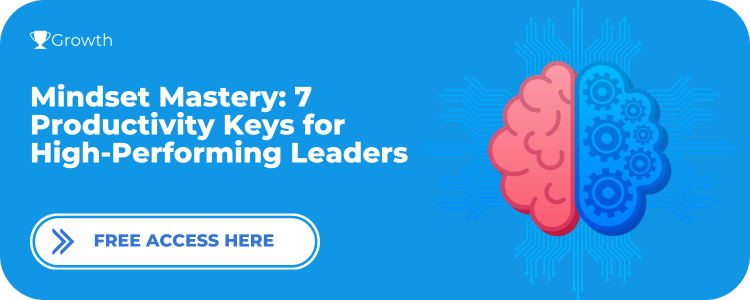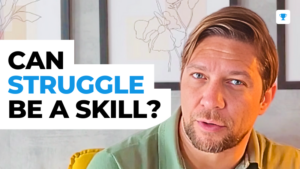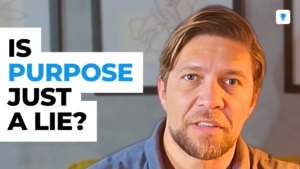
.
✅ FREE WORKBOOK: Mindset Mastery: 7 Productivity Keys For High-Performing Leaders
Podcast version:
How can two people, facing similar challenges, can end up in completely different places?
One rises to the occasion, embracing the journey, while the other stumbles, unable to move forward.
The difference? It’s not their talent or their intelligence. It’s something much deeper—a force that shapes our actions, decisions, and ultimately, our destinies.
In the book Mindset: The New Psychology of Success, Dr. Carol Dweck reveals what lies at the heart of this contrast.
She says:
I realized why I’d always been so concerned about mistakes and failures. And I recognized for the first time that I had a choice.
When you enter a mindset, you enter a new world. In one world—the world of fixed traits—success is about proving you’re smart or talented. Validating yourself. In the other—the world of changing qualities—it’s about stretching yourself to learn something new. Developing yourself.
What’s revealing about this passage is the difference between mistakes and failures, and how they each play a role in shaping a fixed or growth mindset.
This distinction sets the stage for the outcomes we experience in life.
So, to become the person who rises to the occasion, transforming setbacks into positive outcomes, we need to answer three critical questions.
1) What’s the difference between mistakes and failures.
2) Which one should we embrace and which one should we reject?
3) And how do we practically embrace one and reject the other?
But before we get into it, make sure you grant your lifetime access to our free Workbook: Mindset Mastery: 7 Productivity Keys for High-Performing Leaders.
This is your chance to make the mindset shift you need to become a critical thinker by using the 7 mindset keys of the 1% top-performing leaders.
Failures vs Mistakes
One of the most important skills you have to master in your productive life is to learn how to differentiate mistakes from failures.
Why?
Because mistakes are the things you didn’t know would go wrong, and failures are the things you knew all along would go wrong.
Mistakes are made of miscalculations, and failures are made of negligence.
That’s why there is no lesson to be learned from failure. Because failures happen when you neglect your responsibilities.
If failure is related to neglect, then every failure happens by design. That means you have been like that since the beginning. Failure doesn’t provide you with novel and unexpected situations.
There’s nothing in failure that you don’t already possess.
Mistakes, on the other hand, are the most informative streams of media you will ever encounter.
Because by pushing yourself beyond the limits of your current capacity, you find unexpected situations that lead you to make miscalculations that produce obstacles.
And because these obstacles are unexpected encounters with novel situations, they are made of new pieces of information and information means in-formation.
They form you by informing you.
So every time you make a mistake, you learn something new, therefore, you become something more, something better.
That’s why, to produce a forward movement in every intended path in life.
You need to master the ability to avoid failures and embrace mistakes.
How to Avoid Failures
How do we avoid failures?
Imagine that your consciousness is a room full of doors.
Some of these doors are open, and some of these doors are closed.
The open doors are habits you already have, and the closed doors are things you have never done.
Every decision you make produces four different interactions with those doors.
Remember, those doors are in your consciousness, inside this room that we’re calling consciousness. And these doors lead to existential places.
So what are the four interactions?
Every decision you make can keep a door open, close a door, keep a door closed, or open a door.
So the lesson is:
Don’t open doors to places you don’t want to be, and don’t close doors to places you need to be. Don’t do the things you don’t want to become.
The most powerful of all skills is the capacity to do the things you told yourself you would regardless of how you feel.
You do that by adopting responsibility or response-ability, the ability to choose your response.
A choice is the place where your past in future meet because the choices you make today will be your tomorrow’s past. how you choose to respond to your responsibilities today will make that past.
If you master the capacity to do what you must, you will never neglect your responsibilities and failures will not define the outcome of your actions.
But if you’re going to follow duty over feelings, the question is: “What do you do with feelings?” And the answer is: You welcome them as passengers of your journey toward purpose.
You are allowed to feel frustrated, tired, unfulfilled, lost, unappreciated, and unmotivated. But realize that the world doesn’t happen for you the world happens from you.
This is important because if you look back from the place where you are now, you’re going to see a trail leading to this place.
You didn’t just land here. So the emotions you’re feeling right now are the destination of your past choices.
That means the actions you take today can lead to different existential places, like the doors inside the room we were calling consciousness.
You can always open new doors and close old ones.
This is how you avoid failures.
How to Embrace Mistakes
How do we embrace mistakes?
The first thing is: Tell the truth, even if it gets you into trouble.
Why is that?
Because we don’t see the world. There’s too much world to see. Instead, we create a map that overlays the world so we can have meaning, focus, and security.
And that map would do fine if the future always duplicated the past.
But that’s not how life works. Life’s like music. It has some patterns that repeat and other patterns that transform.
We use memory to deal with repetition, and we use conscious decisions to deal with the novelty of life.
So when you lie, you break that moral compass that allows you to interact with this dynamic of life, and ‘X’ won’t mark the spot on your mental map anymore. You get lost.
And make no mistake. Life will require you to make critical and life-changing decisions.
If the map you have to make those decisions is based on false assumptions, You will fall into a pit while expecting to find treasure.
That’s why when you lie, you are the one who’s been lied to.
The second thing to embrace mistakes is to don’t protect yourself from awkwardness.
Why is that?
There’s a concept in medieval alchemy that’s expressed in the Latin phrase: ‘ in sterquiliniis invenitur’ Which means, ‘In filth, it will be found.’
Carl Jung, the founder of analytical psychology, used this term to explain that what you need to see the most will be found where you least want to look.
The most informative experiences are found in the darkest places.
The most important learnings you need to become wiser, stronger, and successful lie on the other side of comfort.
In the King Arthur and the Knights of the Round Table myth, for example, the knights are on a quest for the Holy Grail, a sacred and elusive treasure of great value.
Camelot, the castle where they live, represents a place of safety and order. The surrounding woods represent the unknown and the dangers that lie beyond the secure boundaries of their walls.
In a modern interpretation inspired by Joseph Campbell, each knight, in pursuit of the Holy Grail, decides to get into the woods at the point where it appears darkest to him.
This is to hint that the fastest way to find treasure, is through the most challenging route.
In practical terms, you can think like this:
Winning all the time is the ultimate losing game.
Why?
Because to win all the time, you have to master the set of abilities needed to play the game that you’re playing at the level that you’re playing.
You’re winning all the time because you’re in your comfort zone.
And you might ask, what’s the matter? Can I just be here, winning all the time happily ever after?
The answer is no. Why not?
Because the world around you is constantly moving, and the ground that you’re stepping onto is constantly shifting.
If you keep yourself in your comfort zone, there will come a day when you will stop winning.
But the world around you will be so different, the ground under your feet will have shifted so much that you will feel lost in a way that you won’t be able to recover from.
So, the game of champions is not winning; the game of champions is progress.
Progress requires you to push yourself beyond the limits of your current capacity, make mistakes, and allow these mistakes to inform you so you can update your skills turn these obstacles into tools, and become more than you currently are.
When you think like that, you realize that struggle is meant to teach, not to last.
It works as an upward spiral. The more you struggle, the faster you grow. The faster you grow, the less you struggle.
Awkwardness is a place of discomfort and your dreams lie on the other side of discomfort. That’s why most people don’t go there.
Because to go from a good place, the castle, to a better one, the place where the holy Grail is, you have to go to a worse place first, the darkest woods of the unknown.




